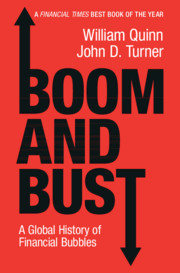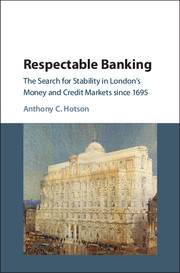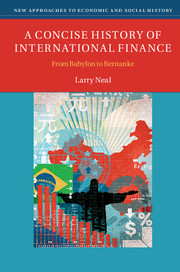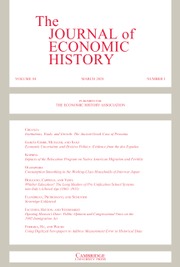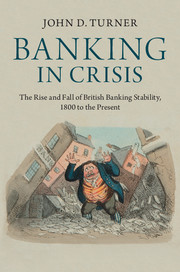Boom and Bust
A Global History of Financial Bubbles
£25.00
- Authors:
- William Quinn, Queen's University Belfast
- John D. Turner, Queen's University Belfast
- Date Published: August 2020
- availability: In stock
- format: Hardback
- isbn: 9781108421256
£
25.00
Hardback
Other available formats:
Paperback, eBook
Looking for an inspection copy?
This title is not currently available on inspection
-
Why do stock and housing markets sometimes experience amazing booms followed by massive busts and why is this happening more and more frequently? In order to answer these questions, William Quinn and John D. Turner take us on a riveting ride through the history of financial bubbles, visiting, among other places, Paris and London in 1720, Latin America in the 1820s, Melbourne in the 1880s, New York in the 1920s, Tokyo in the 1980s, Silicon Valley in the 1990s and Shanghai in the 2000s. As they do so, they help us understand why bubbles happen, and why some have catastrophic economic, social and political consequences whilst others have actually benefited society. They reveal that bubbles start when investors and speculators react to new technology or political initiatives, showing that our ability to predict future bubbles will ultimately come down to being able to predict these sparks.
Read more- Ranges across three hundred years of bubbles from the South Sea Bubble of 1720 to the sub-prime crisis and Chinese stock market crash
- Provides tangible approaches that investors and governments can take to predict and address bubbles
- Shows that not all bubbles are economically destructive and that some have actually benefited society
Awards
- Choice Outstanding Academic Title, 2021, Choice Reviews
Reviews & endorsements
'Where do financial bubbles come from? Can – and should – policy makers always try to stop them? Can investors avoid them? Quinn and Turner take us on an informative, engaging tour of the last three hundred years of bubbles and, using history as their guide, provide intriguing answers.' Richard S. Grossman, author of WRONG: Nine Economic Policy Disasters and What We Can Learn from Them.
See more reviews'Quinn and Turner argue that the essential elements of capital markets: money, credit and speculation are also the necessary ingredients of financial bubbles. Can we have one without the other?' William Goetzmann, author of Money Changes Everything: How Finance Made Civilization Possible
'Quinn and Turner have made a major contribution to the literature on financial speculation and the bubbles to which they contribute. Not only do they provide an analytical dissection of ten salient episodes over some 300 years, they embed these narratives in an explanatory framework – the 'bubble triangle' – that links the relative marketability of financial assets and the supply of credit to speculative excess. Thus, Boom and Bust shows how to mine history for meaning, with lessons relevant today for investors and policy-makers alike.' Bill Janeway, author of Doing Capitalism in the Innovation Economy: Reconfiguring the Three-Player Game between Markets, Speculators and the State
'For anyone interested in financial history, Boom and Bust is essential reading.' John Plender, Financial Times
'An action-packed romp through ten of the biggest bubbles and busts of the past three centuries … Some (most) finance books are arid and hard-going; this one I couldn't put down.' Alistair Haimes, The Critic
'A lovely book. It describes and draws lessons from ten financial manias, from the South Sea Bubble to 'Casino Capitalism with Chinese Characteristics'. It also explains bubbles with what the authors call 'the bubble triangle'. Its three sides consists of oxygen, which is the 'marketability' of assets, fuel, which is 'money and credit' and heat, which is 'speculation'. This combination recurs repeatedly and so do bubbles. Just like fires, financial manias and crashes are destructive, but they can also be useful, by clearing out dead wood.' Martin Wolf, Financial Times, Best Books of 2020
'A readable and impressively researched title to be enjoyed by the generalist or specialist.' Niall McGarrigle, Irish Times
'Written with exquisite concision and packing a wealth of detail and citation into each chapter, Boom and Bust is an instant classic.' Rebecca L. Spang, Times Literary Supplement
'This wonderful book is interesting, informative, and insightful … Highly recommended.' R. M. Whaples, Choice
Customer reviews
17th Oct 2024 by UName-1050241
Financial crises have come back to the forefront. Is there a common thread running through them? Is it the institutional setup? What are the factors linking the crisis of the financial system to developments in the economy and in society? Is it possible to foretell a crisis? Or, it it all just 'uncertain'. These are some the questions that come up time and again on the occasion of a crisis. We have entered a turbulent period, so answers will be sought, given, challenged and revisited. The Boom&Bust publication is a valuable addition to this literature and the search for answers. In this sense, it needs to be read by all students of real-world economics
Review was not posted due to profanity
×Product details
- Date Published: August 2020
- format: Hardback
- isbn: 9781108421256
- length: 296 pages
- dimensions: 235 x 162 x 22 mm
- weight: 0.56kg
- contains: 27 b/w illus. 13 tables
- availability: In stock
Table of Contents
List of figures
List of tables
1. The bubble triangle
2. 1720 and the invention of the bubble
3. Marketability revived: the first emerging market bubble
4. Democratising speculation: the great railway mania
5. Other people's money: the Australian land boom
6. Wheeler-dealers: the British bicycle mania
7. The roaring twenties and the Wall Street Crash
8. Blowing bubbles for political purposes: Japan in the 1980s
9. The dot-com bubble
10. 'No more boom and bust': the subprime bubble
11. Casino capitalism with Chinese characteristics
12. Predicting bubbles
Acknowledgements
Endnotes
Bibliography
Index.
Sorry, this resource is locked
Please register or sign in to request access. If you are having problems accessing these resources please email [email protected]
Register Sign in» Proceed
You are now leaving the Cambridge University Press website. Your eBook purchase and download will be completed by our partner www.ebooks.com. Please see the permission section of the www.ebooks.com catalogue page for details of the print & copy limits on our eBooks.
Continue ×Are you sure you want to delete your account?
This cannot be undone.
Thank you for your feedback which will help us improve our service.
If you requested a response, we will make sure to get back to you shortly.
×
